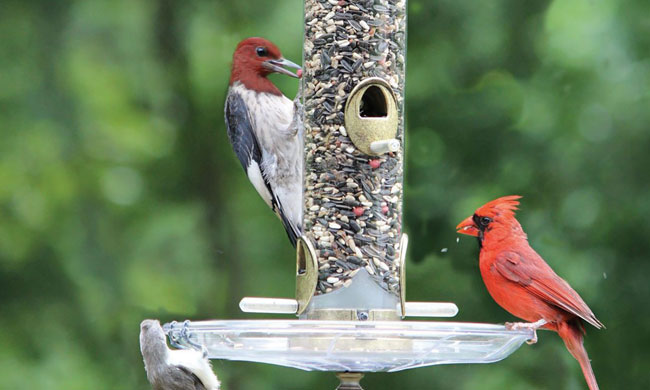Live Better
Why wild bird lovers should choose top-of-the-crop natural feed

(Joan Casanova) Have you ever wondered what’s in your favorite packaged foods, grabbed a box from your pantry, read the ingredients and realized you still didn’t know what you’re eating? The ingredients in some processed foods can read like a chemist’s shopping list. Now imagine if backyard birds could read. What would they say about the ingredients in the food you feed them?
A growing number of Americans are choosing natural foods for their pets; nearly one-third say they prefer natural products, according to PetFoodIndustry.com. People who feed wild birds also want to know they’re feeding the most natural and nutritious options. It’s hard to be confident when reading the mystifying ingredient list on feed bags makes you feel like a bird brain.
With an abundance of options, ranging from commercial bird feeds to small-batch varieties, understanding the differences can help bird lovers make informed choices to meet wild birds’ nutritional needs while considering factors like sustainability and quality.
The wild bird experts at Cole’s Wild Bird Products, Co. offer these tips to ensure you’re feeding your feathered friends a healthy, natural diet.
 While commercial bird feeds aim to provide basic nutrition for birds, the quality and nutritional content can vary. Some mixes contain a high proportion of less desirable seeds and fillers, offering limited nutritional value.
While commercial bird feeds aim to provide basic nutrition for birds, the quality and nutritional content can vary. Some mixes contain a high proportion of less desirable seeds and fillers, offering limited nutritional value.
Small batch bird feeds prioritize nutritional content, using premium ingredients rich in essential nutrients, fats and proteins. This can provide birds with a more balanced diet, promoting overall health and vitality.
Avoid commercial bird feeds that are full of cheap fillers, such as red milo, millet, cracked corn, oats and wheat. Fillers lack nutritional value and birds will kick them right out of the feeder.
Instead, select small batch, natural feed comprised of top-of-the-crop seeds which contain no chemicals or mineral oil like Cole’s and bypass seed coated with them. Some commercial bird feeds are coated with mineral oil and mixed with crushed rock to add “vitamins.” Current regulations allow manufacturers to list nutritional components of mineral oil (iron, zinc) and crushed rock (vitamin A, calcium carbonate) separately, which can make the ingredients look more impressive. Mineral oil makes birdseed shiny and helps hide dirt and dust, and crushed rock adds weight to the product.
Take note of ingredients you can’t read; often it’s an indication the ingredient is synthetic or lab engineered. Ingredients like menadione sodium bisulfite complex and thiamine mononitrate aren’t found in natural foods; they’re man-made versions of vitamins. The rule of thumb for buying all-natural is “If you can’t read it, don’t feed it.”
Focus on serving feed with an ingredient list you can read and understand. For instance, Cole’s Sunflower Meats contains nothing but shelled sunflower seeds and White Millet contains 100% white millet. Super simple, right?
Study birds visiting your feeders and research feed they prefer or buy feed from a reputable company that’s done that work for you. For example, Cole’s offers select natural seed choices developed and based on research about what birds actually eat. Feed is specifically formulated to attract certain species of birds as well as the largest number of birds. No cheap filler seeds are used and seed is cleaned to ensure quality – no sticks and dirt. When you know and serve what backyard birds prefer, they’ll keep coming back for more.
Supplement seed with natural foods you have at home. For example, woodpeckers love raw peanuts, mockingbirds love fruit and chickadees savor suet. Soak raisins and currants in water overnight then serve or purchase blends with a dried fruit and nut mixture, like Nutberry suet. To attract orioles, skewer halved oranges on a spike near feeders.
Buy feed from companies specializing in wild bird food. Some offer bird feed as a side product of pet products or grass seed producers. Conversely, Cole’s exclusively produces and sells products for feeding backyard birds. Seeds are packaged like human food in “Harvest Fresh Lock” packaging so seeds don’t lose nutritional content or dry out and spoil.
To learn more about all-natural feed options with ingredients even birds could understand, visit coleswildbird.com.
Photos courtesy of Cole’s Wild Bird Products
SOURCE:
Cole’s Wild Bird Seed
Live Better
5 home updates to provide peace of mind for your family

(Family Features) Home improvement projects often focus on updating the aesthetic of your house, but upgrades that make your living space more secure and comfortable for you and your family are sometimes even more important.
From your front door to the interior of your home and more, these ideas from the experts at Masonite, a global industry leader in interior and exterior doors, can help provide greater peace of mind – ensuring what matters most is always protected.
Ensure Your Home is Well-Lit
A well-lit home exterior makes it easier to spot potential threats and may even deter people and animals that don’t belong on your property. Automatic outdoor lighting, either set to a timer or triggered by motion or light sensors, can help you see what’s going on outside. Ensure fixtures on your porch, patio and garage are in good working order and replace burned out bulbs or lights that no longer function. Adding landscape lighting can also aid in security while boosting curb appeal.
 Protect Your Home with a Secure Front Door
Protect Your Home with a Secure Front Door
Upgrading your front door can do much more than just improve the look of your home – it’s also an important part of providing enhanced security for you and your family. With four times more impact resistance than a standard deadbolt lock, the M-Protect Multi-Point Security Lock offers homeowners unmatched protection to keep what matters most safe. The lock works like a standard deadbolt, but with more points of contact, and it is compatible with a wide array of handle sets and hardware, including electronic deadbolts. It can be added to any Masonite Performance Door System – an innovative solution that provides superior energy efficiency, performance and comfort – which is available in a diverse range of finishes, colors and glass styles to fit any home design.
Reduce Fire Hazards
Many elements of a home like furnaces, chimneys, hot water heaters and other gas appliances provide value to homeowners through comfort and convenience but can pose risks without proper maintenance. Hiring a professional to check your heating and air conditioning system annually can help you avoid costly repairs while also protecting your loved ones. Keeping the chimney clean of debris, creosote and soot helps lower fire risk and ensures smoke, carbon dioxide and other gases are safely carried out of the home.
Control Home Systems On the Go
Installing security systems, doorbells, lighting and other systems that can be controlled from a smartphone app, like the Masonite M-Pwr Smart Door, can provide added convenience and peace of mind. You can remotely turn lights on and off, unlock doors, change the temperature, open or close garage doors and check camera feeds while away.
Replace Smoke and Carbon Monoxide Detectors
A simple project to make your home safer, it’s essential to check your smoke detectors regularly and replace the batteries every six months. If you discover the date of manufacture on the back of your smoke detectors is more than 10 years ago, replacement is recommended by the National Fire Protection Association. While checking your smoke detectors, test or install carbon monoxide alarms to ensure you have a way to detect the invisible, odorless gas that can cause serious health problems if left unchecked.
Visit Masonite.com/mprotect to learn more about the latest innovations in home security.
SOURCE:
Masonite
Live Better
Throw a party like a pro

(Family Features) Whether you’re celebrating a special occasion or simply catching up with loved ones, playing host can be as demanding as it is enjoyable. Before gathering your crew for your next event, make a plan to ensure you get to enjoy the day as fully as your guests.
Keep the Menu Simple
An ornate spread may be impressive, but your guests are just as likely to appreciate a less demanding menu with a few standout dishes. Offer a single main dish, a couple of tried-and-true sides, some finger foods for snacking and a seasonal dessert. Beverage staples like tea, lemonade and water are all you really need, but if that feels too basic, you can offer a flavor station with fresh fruit like berries and lemon wedges, flavored syrups and other sweeteners. If you’ll be serving alcohol, don’t try to cater to everyone’s favorite. Select neutral white and red wines and one or two beer varieties. A signature cocktail you can premix and serve is another way to add a special touch.
Set a Thoughtful Theme
One area many hosts go overboard is theming their events. While setting a theme can be a fun idea, it doesn’t have to be fussy or complicated, and your decorations don’t have to be over the top. Subtle color, centerpieces and serving pieces are all places you can inject some thematic vibes without investing too much time or money. You can also let your theme influence any games or activities you plan, as well as other entertainment like background music.
Anticipate Guests’ Needs
Thinking ahead about your guests’ comfort can prevent scrambling once the party is underway. Consider needs like seating, where you’ll keep extra food for quick refills and essentials like more toilet paper in the guest bath. Also anticipate accidents like spills and have supplies ready to efficiently correct inevitable incidents. Remember to plan for extra trash bins and if guests will be congregating outdoors, provide extra sunscreen, bug spray and fans.
Organize Entertainment
Depending on the purpose of the party, your entertainment may be pretty clear, but if it’s a casual gathering, you’ll likely want to provide guests some ideas for passing the time. Board games and backyard games are almost always a hit. A playlist that fits your theme can add ambiance and provide background for conversation, but you can also inject some musical fun with karaoke. If you’ll have kids in attendance, provide age-appropriate options for shorter attention spans, too.
Make Cleanup Easy
After the last guest leaves, you may be ready to call it a night, but taking care of a few quick chores can make cleanup easier in the morning. Load the dishwasher and set it to run overnight, leaving any tough dishes to soak in hot, soapy water. Check for any spills or stains that need immediate attention and get a jump start on the floors. For a convenient hands-off experience, try the Eufy S1 Pro Robot Vacuum and Mop, which achieves a 99.99% sterilization rate when mopping and, using automated sensors, elevates the mophead and converts to powerful suction for carpeted areas. After cleaning, the robot docks to automatically empty its dustbin, dispose of wastewater and clean its mopping pads, drying them with hot air to inhibit bacterial growth and odors.
Explore more ideas to tackle entertaining (and its aftermath) with ease at eufy.com.
Photo courtesy of Shutterstock (group of friends)
SOURCE:
Anker Innovations
Live Better
Explore your dream destination:Tips for a a travel adventure

(Family Features) If you find yourself dreaming of sunshine, sand and sparkling pools, it may be time to start looking forward to your next vacation getaway. Get a jumpstart on building excitement for the journey ahead by beginning preparations early, which offers many benefits, including better rates and more time to research your options.
Start exploring ideas for a fun-filled trip with these tips from the travel experts at Funjet, which specializes in providing travelers with vacation packages to hundreds of destinations around the world:
Plan Ahead Booking your vacation well in advance allows you to take advantage of the best deals at
Booking your vacation well in advance allows you to take advantage of the best deals at
the most popular hotels and hottest travel dates. In addition, by being flexible with travel dates,
families can save hundreds of dollars. Moving travel dates by a day or two can result in major savings, often even more than the discounts you can get on last-minute trips.
Research Dream Destinations
Deciding where you want to go is the first step, but with a literal world of possibilities, it can be difficult to narrow down your choices. One place you can find inspiration is by exploring the top travel destinations others are choosing. For example, the top 10 travel destinations booked with Funjet in 2023 include numerous international destinations. Las Vegas is the only U.S. city to make the top 10 list. Mexico is especially popular, with Cancun, Cozumel, Puerto Vallarta and San Jose Del Cabo. Others include Belize City, Belize; Liberia, Costa Rica; Montego Bay, Jamaica; Panama City, Panama; and Punta Cana, Dominican Republic.
Consider All-Inclusive Options
Whether you prefer adults-only or family-friendly, luxury or budget-friendly, there’s a diverse range of all-inclusive resorts to choose from. All-inclusives are known for their convenience and value. They offer hassle-free experiences with meals, drinks and often activities included. While many resorts in Mexico and the Caribbean islands are all-inclusive, be aware that smaller islands like Antigua may feature European plan-style hotels, where meals and drinks are not included.
An all-inclusive package usually encompasses a variety of activities and amenities curated to offer an enjoyable and cost-effective vacation. Within these packages, guests often have the opportunity to access amenities such as swimming pools, engage in sports activities, participate in fitness classes and other entertaining experiences.
Pack Like a Pro
Gathering everything you need for a vacation, especially with kids in tow, can be stressful. To make the process easier, organize your packing based on factors like the length of your trip, airline policies and your family’s activities. Essentials like an umbrella should not be overlooked, especially if your destination’s weather can be unpredictable. Maximize luggage space by packing travel-sized toiletries and put electronic necessities like your mobile device, charger and headphones in your carry-on bag.
Anticipate Extra Expenses
While all-inclusive resorts make tropical getaways stress-free and economical, it’s customary to express appreciation for exceptional service with tips. Resorts typically don’t require tipping, but guests commonly tip as a gesture of gratitude. When deciding to tip, families should consider modest amounts, like $1-5 per meal per person, and be mindful of different service levels as well as the convenience of using local currency. Having cash on hand makes it easier to tip as needed and ensure you have extra for souvenirs and other purchases.
Unplug and Unwind Although most travelers believe it’s essential to stay connected, it’s a good idea to limit screen time so you can make the most of your vacation. Schedule a specific time, preferably in the morning, to address emails and online tasks then enjoy a worry-free rest of the day. While phones are often used to capture photos and videos or look up information about nearby attractions, putting away the screens means you’ll be able to enjoy the scenery, connect with loved ones and have a truly rejuvenating experience.
Although most travelers believe it’s essential to stay connected, it’s a good idea to limit screen time so you can make the most of your vacation. Schedule a specific time, preferably in the morning, to address emails and online tasks then enjoy a worry-free rest of the day. While phones are often used to capture photos and videos or look up information about nearby attractions, putting away the screens means you’ll be able to enjoy the scenery, connect with loved ones and have a truly rejuvenating experience.
Protect Your Group Travel
When traveling with a group, there’s a greater chance of something happening that changes plans between when you book your trip and leave. That’s why it can be a good idea to take a “travel with confidence” approach and consider including a travel protection plan in your reservations. This insurance allows travelers to cancel their trip for any reason, if necessary. When traveling with a group, stick with nonstop flights when possible, as you’re more likely to stay together, which can mean more cost-effective travel.
Enjoy the Experiences
While spending leisure time by the resort pool with afternoon cocktails can be a relaxing reward, you can make the most of a destination vacation by also planning a tour. Many destinations offer services that can assist travelers with booking various adventures, ranging from catamaran cruises to hikes and almost everything in between.
Find more tips and plan your next adventure at Funjet.com or call your local travel advisor.
Where to Stay
Start planning your dream getaway by checking out these traveler-favorite destination properties, based on bookings through Funjet:
Top 10 All-Inclusive Resorts
- Dreams Onyx Resort & Spa (Punta Cana, Dominican Republic)
- Dreams Bahia Mita Surf & Spa Resort (Nayarit, Mexico)
- Riu Caribe (Cancun, Mexico)
- Riu Guanacaste (Costa Rica)
- Riu Negril (Jamaica)
- Iberostar Grand Paraiso (Riviera Maya, Mexico)
- Riu Cancun (Mexico)
- Royalton Riviera Cancun, An Autograph Collection (Mexico)
- Secrets Maroma Beach Riviera Cancun (Quintana Roo, Mexico)
- Secrets Huatulco Resort & Spa (Oaxaca, Mexico)
Highly Rated Hotels for Groups
- Royalton Riviera Cancun, An Autograph Collection (Mexico)
- Dreams Playa Mujeres Golf & Spa Resort (Quintana Roo, Mexico)
- Dreams Flora Resort & Spa (Punta Cana, Dominican Republic)
- Oasis Palm (Cancun, Mexico)
- Hyatt Place Waikiki Beach (Honolulu, Hawaii)
- Marival Emotions Resort & Suites (Nuevo Vallarta, Mexico)
- Royalton Punta Cana, An Autograph Collection (Dominican Republic)
- Manchebo Beach Resort & Spa (Oranjestad, Aruba)
- Bahia Principe Grand La Romana (Dominican Republic)
- Dreams Macao (Punta Cana, Dominican Republic)
- Secrets Playa Blanca Costa Mujeres (Mexico)
- Zoetry Agua Punta Cana (Dominican Republic)
SOURCE:
Funjet
-

 NEWS2 years ago
NEWS2 years ago2 hurt, 1 jailed after shooting incident north of Nocona
-

 NEWS8 months ago
NEWS8 months agoSuspect indicted, jailed in Tia Hutson murder
-

 NEWS1 year ago
NEWS1 year agoSO investigating possible murder/suicide
-

 NEWS2 years ago
NEWS2 years agoWreck takes the life of BHS teen, 16
-

 NEWS12 months ago
NEWS12 months agoMurder unsolved – 1 year later Tia Hutson’s family angry, frustrated with no arrest
-

 NEWS1 year ago
NEWS1 year agoSheriff’s office called out to infant’s death
-

 NEWS2 years ago
NEWS2 years agoBowie Police face three-hour standoff after possible domestic fight
-

 NEWS2 years ago
NEWS2 years agoDriver stopped by a man running into the street, robbed at knifepoint





